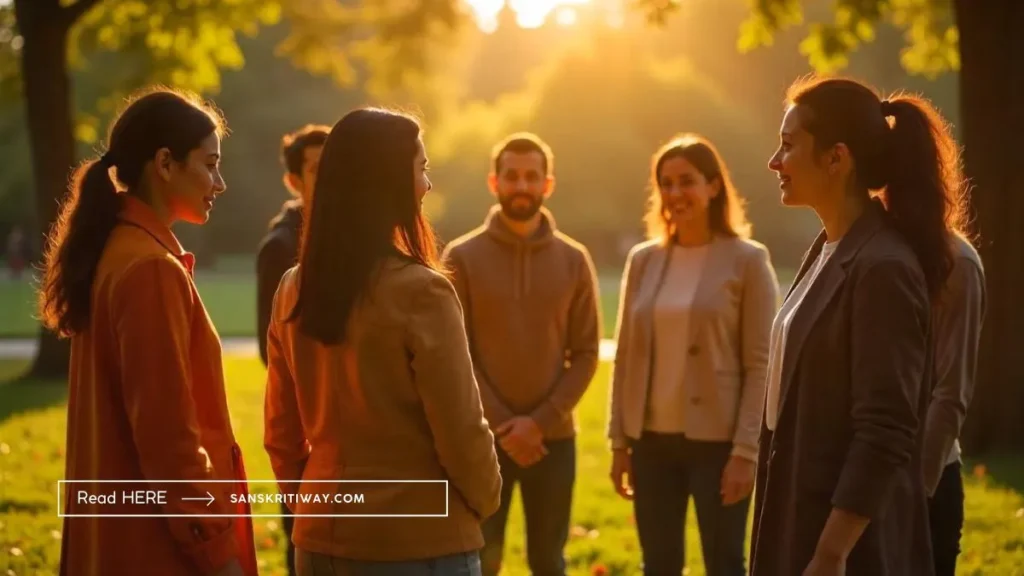Wisdom wasn’t bestowed upon Ashoka; it was earned after a disastrous lesson of brutal force, overpowering ego, and the harsh aftermath of power. The transition from a constantly warring ruler to a deeply compassionate leader is not just ancient history; it is reality. In a world that runs on stress, status, and burning out, his transformation is relatable.
Dhamma, his philosophy, taught more about principles than rituals. Leading with values, maintaining a balance, living, and not losing a sense of self while “winning” are its core elements. In all honesty, we need it more now than we ever have.
This is how we can learn from Ashoka, and the best part? No throne is needed.
Empathy Is the Real Power Move
Celebrating wasn’t an option for Ashoka after the Kalinga war. The brutality of it forced him to break down. But that breakdown? It rewired his entire system. Emotions like understanding and empathy truly can change a person for the better, the most conquering strength is NOT dominating others.
Thinking of today, people still choose to view leadership as pure dominance instead of a personal experience. There is a glimpse of hope, however; the best leaders of our time truly strive to seek a deeper connection and show genuine concern. Without an agenda, one gets to ask how you are doing, and that is the epitome of a good leader.
You don’t need to wear a crown to lead. Simply being able to hear someone out and support them without putting the spotlight on yourself is more than enough to make space for people to be human.
Empathy is not a soft skill. Empathy is a superpower.

Balance Is the New Hustle
Ashoka didn’t abandon his duties; he just stopped letting them consume him. He continued issuing policy and managing governance but made sure that his work served the people and not just his ego.
In our grind culture, balance is almost like a mark of laziness. Not being “on” all the time gives rise to the feeling that one is falling behind. The faint whispers of competition with oneself can become overwhelming and harmful.
True success is one in which your mind is quiet, sleep is undisturbed, enjoyment of sunsets is possible without constant phone checks in between, and you are stress-free and liberated from the chaos of the outside world.
Start with 15 minutes a day devoid of technology. Go for that walk. Leave a single WhatsApp message to read, for peace’s sake. Unlock peace by learning to hustle smart, not endlessly.
Own Your Mistakes—That’s Where Growth Starts
He had the opportunity to assign blame, particularly following the Kalinga incident. Ashoka didn’t. Admitting his mistakes, fully broken, he put himself back together anew—from the breakdown to the rebuild.
That’s so rare nowadays. These days, people have a sensitivity to accountability. People often make numerous excuses and always point the finger elsewhere. Embracing discomfort is where true growth begins and is something not many people seek out. Messed up at work? Step 1—Apologize, learn, and improve. This improvement is not achieved through perfection, but through honesty.
Understanding what needs to change is easy when your next level starts where your denial ends.
Stop the Gossip—Build the Vibe Instead
Ashoka offered respect to everyone, even critics.
At a social event or in the office, everyone’s sharing of gossip loosely trumps their sharing of goals. Initially it seems without consequence, until it becomes a trusted habit.
Use that power to lead by example. Don’t feed the drama; shift the focus to celebrating others when it’s easier to criticize.
The positivity shines from individuals that refuse to cast shade.

Invest in People, Not Just Performance
His legacy extended far beyond ruling, as Ashoka was known as a nurturer. The impact he left by planting trees for future generations and building infrastructure did more for others than gain for him.
Real flex? Supporting someone to help them succeed while keeping it to yourself.
Stay Grounded, Even When You’re Winning
Despite holding absolute power over an empire, Ashoka maintained a keen awareness of everyday life. He strolled down to the villages, listened to his subjects, and kept a low profile.
That attitude? It is uncommon nowadays. We achieve a single step toward our goal and let that get to our heads. Maturity is being levelheaded, celebrating milestones without losing oneself.
Occasionally the loudest person in the room has not earned the title of the most powerful person in the room. Remain friendly. Stay inquisitive. Be genuine.
Your roots are essential, regardless of how high you soar.
Dhamma, Reimagined for Right Now
Ashoka’s Dhamma is not an artifact from history. It only goes to show that passive forms of peace and silent leadership are not a thing, especially in today’s world where being empathetic is treated as taboo, comparison is a constant rivalry, and burnout is normalized—Ashoka’s approach offers a different perspective.
The focus shouldn’t be “not striving for a flawless outcome,” but instead “aiming to improve.”
Empirical data backs preaching, “There’s strength in powerless controlling” and “It’s all about connection.”
Looking to Kickstart From Somewhere?
- Don’t reply to every notification immediately.
- Thank someone for their help—genuinely.
- Pause before you snap.
- Say, “That’s on me” without flinching.
- Text your parents back.
- Help someone without posting it.
Shifts that seem small but have a monumental impact. Change is within reach. Ashoka became wise overnight, while we must tread the slow and steady path that begins with a single step.
Visit Sanskriti Way
